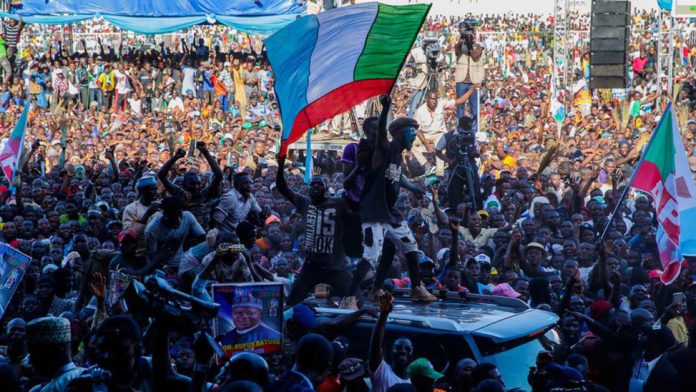By way of introduction, this serial, Political Power in Nigeria, will analyse the dynamics of Nigerian politics, particularly democracy and the politics of succession. Hopefully, it will terminate after the general election in February. Its objective is to contribute to the understanding of the conflicting dynamics of the Nigerian political space. The first point of analysis is to look at the power perspective to understanding Nigerian politics in the context of the preponderance of pollster projections ahead of the 2023 general election.
A few scholars have attempted to look at the dynamics of Nigerian politics in the past and contemporary times from the prism of power. For example, Professor Emmanuel Aiyede of the Political Science Department, University of Ibadan wrote “Emi lokan: Between elite political settlement and the real politik of individual ambition.”
Aiyede noted that the resolution of the June 12 crisis of the 1990s was based on the principle of power shift and rotation of key political offices between the north and the south. However, the advent of Alhaji Atiku Abubakar and Senator Bola Ahmed Tinubu as the flag bearers of the Peoples Democratic Party (PDP) and All Progressives Congress (APC) respectively, he argued, has upended the very principle, and would perhaps undermine the stability it was meant to guarantee in the polity.
Anoja Adagbo, Editor of an online medium, Intervention, and currently a doctoral candidate at St Andrews University, Scotland, analysed the contradictory dynamics of the ruling APC, titled “Power Struggle Rocks APC, Nigeria’s Ruling Party, Over Choice of Presidential Candidate”, posted on June 6, 2022. He mainly underlined the lurking danger for the party on the choice of either a candidate from the north or the south in a divided wall of reasoning between the party leadership and the governors.
Dr. Edwin Madunagu, former Oped Editor of The Guardian, and Chairman of the Editorial Board, has kept pace with analysing the power-blocs in the country with several essays on the power-blocs and their instruments of contestation for power. He wrote “Obasanjo and the Third Power-Bloc” on November 23, 2000, where he underlined two main power- blocs, namely, northern and southern blocs, the former traced to Alhaji Ahmadu Bello and the latter built on the heritage of Chief Obafemi Awolowo.
In his essay titled “Nigeria and the Concept of the balance of Power” (2004), Taiwo Akinola, a consistent voice from London, and staunch member of the Movement for National Reformation (MNR), has underlined Nigeria’s problem as the absence of balance of power between the component nationalities.
Professor Brown Onuoha, a retired lecturer from the University of Lagos, has consistently emphasised the need for political scientists to focus on power as sociologists who focus on society. Thus, there is no major discontent in a power perspective to grappling with the pace of politics in Nigeria.
However, an analysis of the locus of power will enhance understanding of the possible outcome of the ongoing succession process, that is, who will become the president of Nigeria in May 2023. To walk along this path, would mean an examination of what Odia Ofeimun has called the ‘Lugardian Architecture’, “a sacral writ which requires power to reside only where the colonial mandate wanted it to be or in favour of British exploitation” upon which I shall invest elaboration.
Despite other insights on this subject, Ofeimun’s argument is instantiated by the nature and content of the institutions of the state, accounting for the reification of the Lugardian Architecture. A recourse to the insights offered by Peter Smithers and Harold Smith, two British bureaucrats, on the rigging of the 1959 general elections; Kole Omotosho and Babatunde Ahonsi, on the manipulation of census figures in “Just Before Dawn” (1988) and “Deliberate Falsification and Census Data in Nigeria” (1988); and Kunle Lawal’s “The United States and the Decolonisation Process in Nigeria” (1945-60) [1996], would provide evidence on the fostering of an inheritance elite in the Nigerian state.
I shall revert to the above references in subsequent installments of this serial. Certainly, to track the possible trajectory of power in 2023 requires a scrutiny of the occupants who control the levers of power in that Lugardian edifice. Like it or not, the wielders of power, in other words, the “owners of Nigeria” who control state institutions, will determine, in the main, the outcome of the ongoing electoral turnover.
Therefore, it is apposite to ask: What is the thinking in the northern power-bloc? Is the bloc ready to concede power to the south in 2023? Is it thinking of retaining power? Will contrived political strictures hinder a smooth transition of power come 2023? Does the emergence of Atiku as PDP’s flag bearer, despite the party’s constitutional provision on rotational principle that is now controversial, mean a reluctance to shift power to the south? What are the likely consequences of a derailed electoral turnover? I shall address these questions subsequently. Next, I shall discus the Lugardian Architecture.
Akhaine, a Professor of Political Science and visiting member of The Guardian Editorial Board, was the former General Secretary of the Campaign for Democracy in Nigeria.

